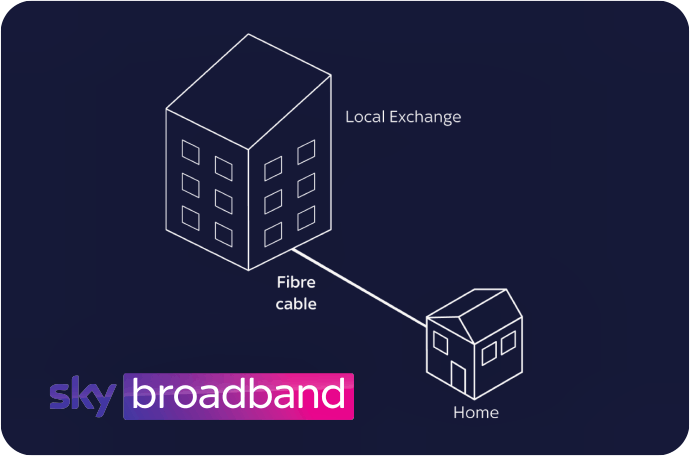Sky FTTP: Our guide to Sky Fibre-to-the-Premises
Thinking about getting a Sky FTTP broadband package? Here’s everything you need to know.

With more and more people working from home - not to mention streaming high definition entertainment - fast, reliable broadband is quickly becoming essential.
Right now, an FTTP connection (sometimes called full fibre) is the only way to get the highest speeds and the most stable connection. But what is FTTP? Read on for our comprehensive guide to this game-changing technology.
What is FTTP?
FTTP stands for Fibre-to-the-Premises, which essentially means that broadband is supplied via fibre optic cables directly to your home or business. Fibre optic cables allow for much higher broadband speeds, and a more consistent connection, than the more traditional copper DSL (Digital Subscriber Line) cables.
What is the difference between full fibre and FTTP?
There is no difference! The term ‘full fibre’ simply means that fibre optic cables are used at every point of the connection between the local internet exchange and your property, meaning FTTP is a full fibre service.
What is the difference between FTTP and FTTC?

Fibre-to-the-Premises is easily confused with FTTC, which stands for Fibre-to-the-Cabinet. This is a semi-fibre connection, as fibre optic cables are only used from the local internet exchange to a nearby cabinet. Traditional DSL cables are then used to provide the connection between the cabinet and your property.
FTTC is currently the most widely-used form of broadband connection, but it doesn’t have the same reliability and doesn’t offer the same high speeds as a full fibre FTTP service.
How do I know if I have FTTP or FTTC?
The most surefire way to confirm which type of connection you currently have is to check with your supplier. They should have a record of the installation and what is available in your area.
Of course, you could also have a look at the lines your router is using. Properties with FTTC will use the existing telephone line, whereas properties with FTTP will use a separate, dedicated Optical Network Terminal.
How does FTTP work?
FTTP uses a single set of fibre optic cables to transfer data between the exchange and your property. This means there’s no need to pass data through a street cabinet and traditional DSL copper cables, which in turn means the connection can handle greater loads at higher speeds.
Copper cables were originally designed for landline phone services and later adapted to be used for broadband, whereas fibre optic cables are specifically designed for carrying data. They are also much more resilient than traditional copper cables, which means they are less likely to degrade over time.
A dedicated fibre optic connection is able to provide speeds 25 times faster than those of a traditional FTTC line. Sky’s full fibre services offer speeds of up to 900Mbps - fast enough to stream in 8K resolution and download an Ultra HD movie in less than 10 seconds.
Which providers offer FTTP packages?
Most of the big-name broadband providers offer a number of FTTP packages, at various different speeds and price points. Check out the table below for a brief rundown of the services to look out for.
| Provider | FTTP Packages | Deals |
|---|---|---|
| BT |
| See latest BT deals |
| Virgin |
| See latest Virgin deals |
| Vodafone |
| See latest Vodafone deals |
| TalkTalk |
| See latest TalkTalk deals |
| Plusnet |
| See latest Plusnet deals |
| NOW |
| See latest NOW deals |
| Sky |
| See latest Sky deals |
Is Sky FTTP available in my area?

Full fibre broadband is now widely available across the UK, and is being rolled out to more and more places every day.
You can use Sky’s full fibre broadband postcode checker to find out if FTTP is currently available in your area. If not, don’t worry - work is still ongoing to upgrade traditional networks to full fibre, nationwide, and you can register your interest with Sky to be notified as soon as full fibre becomes available in your area.
How much does Sky FTTP cost?
Sky offers a range of full fibre packages with average download speeds ranging from 35 to 900Mbps, meaning there is a service to suit every need. You can also bundle other Sky services, such as Sky Stream and Sky Cinema, with your full fibre broadband to create a package that’s right for you.
For a full breakdown of the latest Sky broadband packages, check out our Sky broadband deals page.
Sky Superfast Fibre
Superfast is Sky’s entry-level fibre broadband, and is offered at two levels: Superfast Fibre 35, which provides average download speeds of 35Mbps, and Superfast Fibre 80, which provides average speeds of 61Mbps.
It’s worth noting that Sky’s Superfast broadband will only use FTTP where available, and will otherwise use alternative fibre technologies, like FTTC.

Sky Superfast Fibre 80
£25.00 a monthPrices may change during contract
- Full fibre where available
- Average download speeds of 61Mbps
- 24-month contract
- No upfront cost
Sky Ultrafast Fibre
Ultrafast is one step up from Sky’s basic Superfast fibre broadband packages, promising average download speeds of 150Mbps at a marginally higher monthly price.
Like Superfast, Ultrafast will only take advantage of FTTP technology where available, so it’s worth checking what’s currently installed in your area.
Sky Ultrafast Plus Fibre
Sky’s Ultrafast Plus broadband offers more than double the average speeds of the base Ultrafast service, at an average of 500Mbps for downloads and 60Mbps for uploads - ideal for streaming, gaming and home working.
This service also comes with a speed guarantee of 400Mbps, meaning that if your average speed drops below that minimum, you’ll be eligible to claim back the cost of a month’s subscription. Ultrafast Plus can only be delivered through FTTP technology.

Sky Ultrafast Plus Fibre
£29.00 a monthPrices may change during contract
- Full fibre
- Average download speeds of 500Mbps
- Speed guarantee of 400Mbps
- 24-month contract
- No upfront cost
Sky Gigafast Fibre
At the top end of Sky’s full fibre broadband range is its Gigafast service, which boasts a staggering average download speed of 900Mbps - 25x faster than the basic Superfast 35 fibre broadband, and fast enough to stream UHD movies and connect more than 120 devices at once.
This is truly as good as fibre broadband gets, and can only be delivered through full FTTP technology.
How to get Sky FTTP

If you’re an existing Sky customer looking to upgrade your broadband package or looking to switch from a different supplier to one of Sky’s FTTP services, call our dedicated team on 0330 1656 733.
Alternatively if you wanted to chat about another service, check out our handy Sky contact number guide.
Find a Deal
Enter your postcode to see the latest offers in your area.
Latest News
Featured Guides
Broadband Speed Test
Find out whether you could be getting faster home broadband speeds. Our speed test will check your current broadband and let you compare with other speeds in your area.
Test your broadbandBroadband Usage Calculator
Answer a few quick questions and our broadband usage calculator will give you a data estimate for your household. Using this we'll recommend the best kind of deal for you.
Calculate











